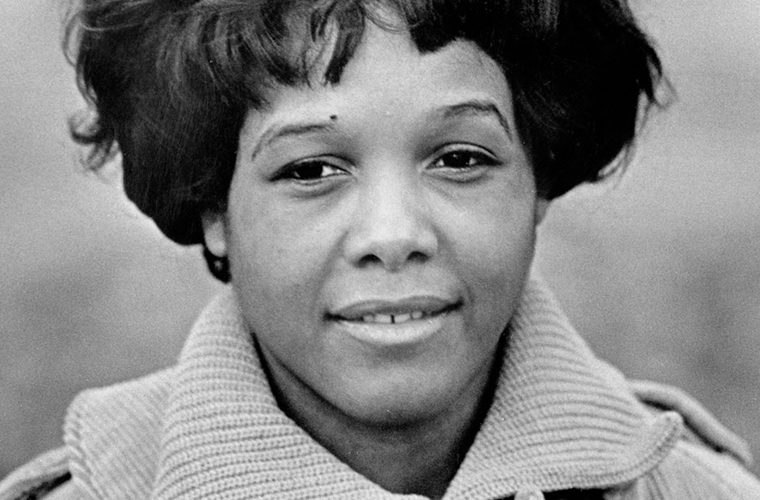
“Anne Moody didn’t just write about the civil rights, she lived it.”
Before going “underground” in New York City and becoming a heralded author, Centreville native Anne Moody gained acclaim as one of three activists mobbed at Woolworth’s lunch counter in Jackson in 1963. Along with fellow Tougaloo student Joan Trumpauer and professor John Salter, Jr., she endured verbal taunts as well as assault with flour, salt, sugar and mustard.
The infamous attack, chronicled in the Jackson Daily News, happened just two weeks before the assassination of Medgar Evers. Enrolled on academic scholarship at Tougaloo, Moody also was arrested when she and thirteen others attempted protest inside a post office in Jackson.
Nearly sixty years later, the Mississippi Legislature in its 2018 session recognized and honored her through passage of House Bill 1153 that designated a section of Mississippi Highway 24, from Woodville to Centreville, as the Anne Moody Memorial Highway. The Mississippi Department of Transportation held a dedication ceremony in February 2019.
Anne Moody chose her name after discovering that her birth certificate recorded Annie; her sharecropper parents had called her Essie Mae. Born in 1940, she suffered a harsh childhood of hunger, poverty, and brutality. When just fourteen years of age and working for a “mean white woman,” she learned of the murder of Emmett Till, also only fourteen. The more she learned about racial discrimination and abuse, the more she hated white people for countless murders and resented Black people for not fighting back; she determined to effect change.
She began that journey through a basketball scholarship to the segregated Natchez Junior College and continued as a Tougaloo student, where she affiliated with Congress of Racial Equality (CORE), National Association for the Advancement of Colored People (NAACP), and Student Nonviolent Coordinating Committee (SNCC).
Her activism with CORE and other civil rights events resulted in Moody’s being on the Ku Klux Klan’s “hit list.” Not deterred, she graduated in 1964 and raised funds for CORE nationwide during Freedom Summer. Meeting and working professionally with such top civil rights activists as Martin Luther King, Ralph Abernathy, and John Lewis, she participated in the March on Washington, hearing Dr. King give his famous “I’ve Got A Dream” speech.
Later in the sixties, she moved north, where she coordinated a civil rights training project at Cornell University and wrote her now-classic book, Coming of Age in Mississippi, published in 1968 by Doubleday and covering childhood, high school, college, and her civil rights work.
For The New York Times Book Review, Senator Edward Kennedy called Moody’s book “a history of our time, seen from the bottom up, through the eyes of someone who decided for herself that things had to be changed … a timely reminder that we cannot now relax.”
Chicago Tribune declared it to be “simply one of the best … Anne Moody’s autobiography is an eloquent, moving testimonial to … courage.”
Her publisher also praised the work: “Written without a trace of sentimentality or apology, this is an unforgettable personal story—the truth as a remarkable young woman named Anne Moody lived it. To read her book is to know what it is to have grown up black in Mississippi in the forties and fifties—and to have survived with pride and courage intact. In this now-classic autobiography, she details the sights, smells, and suffering of growing up in a racist society and candidly reveals the soul of a black girl who had the courage to challenge it. The result is a touchstone work: an accurate, authoritative portrait of black family life in the rural South and a moving account of a woman’s indomitable heart.”
Amazon continues in 2023 to get readers’ reviews. “Part of it is about my family. True stories!” “My freedom hat comes off to Anne Moody. A great read on the early struggles of civil rights in this country.” “The autobiography is intense, great, eye-opening, haunting and unabashedly prolific. A story of anger to productivity. A must read. I recommend.”
Shortly after publication, the National Council of Christians and Jews bestowed the Brotherhood Award on Coming of Age in Mississippi, and the National Library Association awarded it Best Book of the Year.
After the book’s publication, Moody continued a life largely removed from the public spotlight. She finally did an interview in 1985 with Debra Spencer, in which she revealed, “Just as I’d finished Coming of Age, I met a man, (and) fell madly in love. I lived with him for almost a year and married him on March 9, 1967. He was a Jewish guy from Brooklyn, an NYU graduate student in philosophy.”
Moody married Austin Straus later that year, and they became parents to a son, Sasha, born in 1971. The following year, the family moved to Berlin where she worked as an artist-in-residence and they lived until 1974 when they returned to America. The couple divorced in 1977, and Straus soon moved to Los Angeles where he became known as a distinguished poet and painter; he died in 2017, just two years after the death of his former wife.
“Anne Moody didn’t just write about the civil rights, she lived it,” the Black History in America (BHA) website declares. Her book “helps us to understand life in the South both before and during the Civil Rights Movement and shows the struggles and triumphs and also the enduring problems that came out of the Movement. It also shows racism from the perspective of a child.”
BHA provides this excerpt from Moody’s writings: “When I could no longer see that anything was being accomplished by our work there, I left and went North. I came back to see through my writing that no matter how hard we in the movement worked, nothing seemed to change; that we made a few visible little gains; yet at the root, things always remained the same; and that the movement was not in control of its destiny, nor did we have any means of gaining control of it. We were like an angry dog on a leash that had turned on its master. It could bark and howl and snap, and sometimes even bite, but the master was always in control. I realized that the universal fight for human rights, dignity, justice, equality, and freedom is not and should not be just the fight of the American Negro or the Indians or the Chicanos. It’s the fight of every ethnic and racial minority, every suppressed and exploited person, every one of the millions who daily suffer one or another of the indignities of the powerless and voiceless masses.”
A piece for Black Past reports that Moody published a second book, Mr. Death, a collection of short stories, in 1975 and that she moved back to Mississippi in the early 1990s. Under the care of her younger sister Adline Moody and suffering from dementia, the civil rights activist and writer died at her home in Gloster in 2015. Survivors included her son, Sasha Straus, four sisters, and three brothers.











